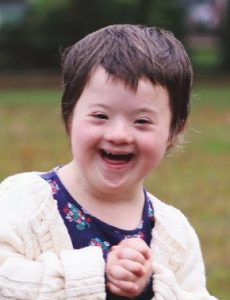Down Syndrome
Down Syndrome
It is a genetic disorder which causes change in developmental features and physical features resulting from an extra copy of chromosome 21. It’s features varies from developmental delay, showing features of down syndrome and some lifelong disabilities including heart, brain and gastrointestinal disorders.
Symptoms
Common Features of the Down Syndrome are enlisted below
but they vary from individual to individual, in some individuals
intellectual and physical features are very prominent where as
in some individuals they are less.
Most common of them are short height, flat face, short neck, small head, protruding tongue and cognitive impairment. Other features include small ear, short and wide hands, poor muscle tone, excessive flexibility
Causes
Down Syndrome is not inherited it is causes by abnormal pair of chromosome coming from each parent, risk factors include old parents or having already down child.
The most common genetic disorder causing down syndrome is extra copy of chromosome no 21, called Trisomy 21, Another case has only few cells of chromosome 21 but not full chromosome, where as last condition called translocation occurs when a small portion of chromosome 21 becomes attached to another chromosome 21
Complications
Individuals with down syndrome can live up to 60+ years, but they have lot of abnormalities to face during life span.
- More than half children with down syndrome are born with congenital heart defects.
- They face GERD, dysphagia, heartburns, blockage, problems with intestine and trachea.
- Their immune system is very weak, they are prone to more infections, autoimmune diseases and cancers.
- They have greater risk of obesity which leads to sleep apnea.
- Others face Dementia, Leukemia, Cognitive impairment, seizures etc
Diagnosis
All Parents should screen for genetic abnormalities during pregnancy.
First trimester Blood Test:
High level of Plasmaprotien-A and human chrionic gonadotropin HCG may indicate genetic abnormalities but it does not confirm the diagnosis. Further need to do ultrasound and genetic counseling.
Second trimester Blood Test:
Alpha fetoprotein, estriol, Plasmaprotien-A and human chrionic gonadotropin HCG these four tests are done if they are high than we go towards confirmatory tests which are
A: Chorionic Villus Sampling
B: Amniocentesis
These tests are done during 13th-15th week of pregnancy, the chance of miscarriage is very less and they are confirmatory for the diagnosis. In A cells are taken from placenta and in B amniotic fluid is withdrawn for genetic study of fetus. After birth of the baby diagnosis can be made with features present or blood sample karyotying.
Treatment
The genetic cause is irreversible, but to take care of baby you will need a team of pediatric specialist to improve the skills, speech therapy, physical therapy, occupational therapy and educational training.
